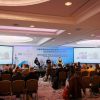On June 7, the New Europe Center became the co-organizer of Democracy in Action: Zero Corruption Conference. The New Europe Center team was the initiator and organizer of two discussion panels within the conference:
- “Regional Democracy Trendsetters. Ukraine’s, Georgia’s, and Moldova’s Successful Transformation as a Democratic Model For Other States in the Region”
- “Ukraine and Georgia in NATO2030. Alliance’s “Open Door Policy” as a Tool for Enhancing Democracy and Good Governance”.
Within the discussion panel Alyona Getmanchuk, Director of the New Europe Center presented the new discussion paper by our team of researchers “Route to membership. Why should Ukraine have a roadmap to NATO accession?“, prepared deliberately for the conference. The paper aims to unlock a dialogue on Ukraine’s future membership in NATO.
Key point: “The New Europe Center offers to develop a detailed roadmap on reforms – Ukraine’s Compatibility plan with NATO. This roadmap will prepare Ukraine to membership and will enable Ukraine to join the Alliance as soon as there is a window of opportunity.“
Within the panel, the distinguished speakers discussed a number of issues related to the future membership of Ukraine and Georgia in NATO and the current situation in Ukraine’s and Georgia’s relations with the Alliance.
Speakers:
Olha Stefanishyna, Deputy Prime Minister for European and Euro-Atlantic Integration of Ukraine
- The Bucharest summit is, undoubtedly, a historic event and now we need historic answers. And the historic answer is what we expect to see not only in the light of the upcoming summit and events. We want to see the answer and the day which will be feasible for our country to become the member of NATO.
- There is no other timeline for where Ukraine can hear this answer, because except of the fact that NATO is in light of development its next 10 years strategy and the open-door policy will be the new policy elaborated and presented in this NATO 2030 process.
- Today Ukraine is not only the security recipient, but a security donor in this region. First of all, as a leader in knowing and having the practical experience in tackling hybrid threats which are not only the military ones. Ukraine remains committed to building global security without nuclear weapons and it remains the commitment from our side also. Ukraine is one of the few countries in the Euro-Atlantic area, that even without being a member of the Alliance, adheres to the requirement of the defense spending at the level of no less than 2 % of GDP.
Laura K. Cooper, Deputy Assistant Secretary of Defense for Russia, Ukraine, Eurasia, the U.S. Department of Defense
- Ukraine is a critical partner on the frontline of Russian aggression. Russia’s aggression is not only a threat to Ukraine, but a threat to international order.
- The United States encourages legislation that delineates the duties of the Ministry of defence and Ukraine armed forces. This will further align Ukraine to civilian control of the military. We Urge Ukraine to adopt a strategy to better support the needs of Ukrainian armed forces, while implementing effective corporate governance that is in line with global practices.
- Ukraine must continue human resource management reforms, to truly transform the Ukrainian armed forces, and pave the way for a western style career management system
Rasa Juknevičienė, Member of the European Parliament, President of NATO Parliamentary Assembly (2018)
- NATO always says that no third country has veto right. NATO now has to go forward with a more complete plan for membership for Georgia and Ukraine, they must show that there is no third country veto right.
- The most important issue, Membership or MAP for Ukraine and Georgia, can help Russia be different in the future. The only way to help Russia is to help Ukraine and Georgia join NATO. Without this, Russia will remain imperialistic.
Irakli Porchkhidze, Co-founder and Vice-President of the Georgian Institute for Strategic Studies, Deputy National Security Advisor to the President of Georgia and Deputy Secretary of the National Security Council of Georgia (2010-2012)
- Since 2008 and even before Georgia has been defending the very values that NATO is based on, and the question of what might be coming if Ukraine and Georgia are not included in some very near future, is what’s happening in the region right now – the general meltdown of democratic tendencies and democracy as the concept.
- These countries have been trying to defend their democracies, and are at the forefront of this fight. By supporting Georgia and Ukraine, you are directly or indirectly supporting the trends that you want persisting in the region.
- If NATO wants to be more relevant, they will have to continue advocating for the instruments of open door policy. If NATO doesn’t take it seriously in this region, arguably the most important region, its relevance will be diminished.
Moderator: Katarzyna Pisarska, Co-Chair of Warsaw Security Forum
The video recording from this discussion panel is available here.















